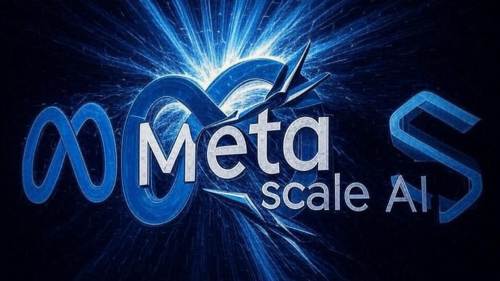AI Navigation
- articleAI Trends
- lightbulb_2AI Tips
- assistant_navigationAI Navigation
- heatHot Articles
- emergency_heat_2Hot Tips
- format_list_numberedPrompt Formatter
- psychologyTest Center(RPI)
Meta Eyes $10B+ Acquisition of Scale AI: A Strategic Gamble or Defensive Move?
As the global AI arms race intensifies, Meta is accelerating its artificial intelligence ambitions. According to multiple media reports, Meta is considering a massive investment—potentially over $10 billion—to acquire Scale AI, a leading provider of AI data services. The move has sent shockwaves across the tech industry. Why is Meta targeting this behind-the-scenes data company? Is this a strategic offensive or a defensive reaction? And what does it mean for Meta's place in the AI foundation model ecosystem?

Meta Is Falling Behind: Big Models, But No Breakthrough Product
Since the release of ChatGPT, the AI world has been in hyperdrive. OpenAI, Google Gemini, Anthropic’s Claude, and Elon Musk’s Grok have all launched highly visible, consumer-facing AI products. In contrast, Meta—despite releasing its open-source LLaMA series—has yet to launch a “killer app” that captures mainstream attention.
In the foundation model race, data, algorithms, compute power, and real-world applications are the four cornerstones. While Meta has the compute and research strength, it lags in two key areas: access to proprietary high-quality data and productization of its models. This gap is fueling growing internal anxiety. Acquiring Scale AI may be Meta’s boldest attempt yet to fill in those missing pieces.
Who Is Scale AI—and Why Does It Matter So Much?
Founded in 2016 by then-19-year-old Alexandr Wang, Scale AI has evolved from a niche data labeling company into one of the most critical players in the AI data infrastructure space. Headquartered in San Francisco, the company provides high-quality labeled data across modalities—image, text, speech, video—and serves as a key training data supplier for some of the world’s largest AI models.
Its core strengths include:
-
Massive-scale AI data processing: Capable of handling tens of billions of labeled data points for training frontier models.
-
Human-in-the-loop precision: A unique hybrid system that combines human oversight with automated tools to ensure top-tier data quality.
-
Industry vertical expertise: Deep penetration in high-barrier fields such as autonomous driving, defense, healthcare, and finance.
-
Track record with top AI labs: Scale’s data has powered models from OpenAI, Anthropic, Google, and yes—Meta itself.
In short, Scale AI is the “data engine” of the foundation model era. Controlling it means controlling the fuel for the next generation of AI.
What Does Meta Hope to Gain?
1. Building Its Own Data Moat
High-quality training data is now more valuable than algorithms themselves. Meta has long relied on external providers for labeled data, limiting its agility and privacy control. Acquiring Scale AI would give Meta end-to-end data autonomy and allow it to construct a proprietary AI data pipeline.
2. Improving LLaMA’s Performance
While Meta’s LLaMA models have been well-received in open-source communities, they still trail models like GPT-4 in performance and versatility. Scale AI could provide the rich, fine-grained data needed to dramatically enhance LLaMA’s quality, generalization, and downstream usability.
3. Blocking Rivals in the AI Resource War
With OpenAI backed by Microsoft, Anthropic by Amazon and Google, and Grok integrated into Elon Musk’s X ecosystem, the battle lines are drawn. If Meta doesn’t secure its own data backbone now, it risks being permanently outpaced. This move is as much about defense as it is about offense.
4. Expanding Into the Enterprise AI Market
Historically, Meta has been consumer-focused, with limited presence in B2B AI. Scale AI, on the other hand, has strong enterprise and government ties—including clients in defense, finance, and autonomous tech. A successful acquisition would give Meta a powerful entry point into commercial AI.
A Calculated Strike—Or a Desperate Defense?
Although Meta has long stated that AI is the "main track" of its future, the gap between that vision and its current results is increasingly apparent. Its lack of breakout AI products has weakened its positioning in the AI ecosystem. This potential $10B+ investment in Scale AI looks more like a strategic reaction than a proactive play.
Open-source success hasn’t translated into consumer dominance. Without an AI assistant, creative tool, or enterprise-grade AI platform to rival ChatGPT or Gemini, Meta risks falling into a trap: technical brilliance, but no product market fit.
Acquiring Scale AI is a way to buy time and infrastructure—to complete the triangle of “data → model → application.” But that window is closing fast. If Meta waits too long, it may lose its place at the AI table entirely.
Can This Acquisition Turn the Tide?
Meta’s acquisition of Scale AI could be a masterstroke—but it won’t be easy.
-
Can the two businesses integrate quickly? Capital injection alone won’t create synergy unless operations align.
-
Will Meta continue LLaMA’s open-source strategy? Locking down the model too tightly post-acquisition could alienate its core developer base.
-
What about Scale’s other clients? With Meta as its owner, will competitors abandon Scale AI due to trust concerns?
-
Will regulators approve the deal? Given AI’s strategic importance, antitrust or data security scrutiny is likely.
And perhaps most importantly: Meta still needs a breakthrough product. Whether it’s a powerful AI assistant or an enterprise-focused platform, success will depend not just on the model or the data—but on user-facing innovation.
In the end, this potential acquisition is more than just a business move. It’s a signal. A $10 billion declaration that Meta won’t accept being sidelined in the AI revolution. Whether this gamble pays off—or becomes a cautionary tale—will define Meta’s place in the next tech era.
The future is arriving fast, and Meta has no more time to waste. Scale AI may be its last, best chance to catch up.